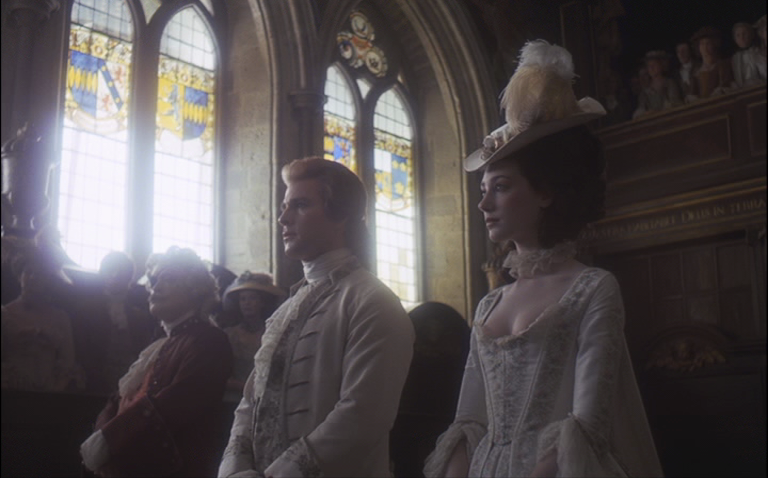Kubrick: Barry Lyndon part 7
SCENE 63. We come back from intermission to find a title card announcing that the remainder of Barry Lyndon will be about Barry’s fall from good fortune. The first part of the movie — the first six acts — were about Barry’s rise to wealth and power, and the second part will concern his undoing.
That would make Scene 63, which shows the wedding of Barry to Lady Lyndon, dramatically, the pinnacle of Barry’s joy. He’s gone from being a love-sick middle-class goon to being married to a genuine capital-L Lady. He’s been re-born a number of times so far in the movie, but the wedding is the moment where he has finally, he feels, entered into his true domain: a gentleman of wealth and taste.
We see Barry’s allies in attendance at his wedding: the Chevalier de Balibari and his mother are both there lending their support. If Barry’s mother sees anything untoward in her son’s marriage, she doesn’t show it: she, too, seems to feel that she has finally entered her proper sphere at the mother to a gentleman of wealth and taste.
Reverend Runt performs the ceremony, and Kubrick gives special emphasis on the nature of marriage among nobles in 1773. Marriage, says Runt, is what saves humans from acting “in carnal lust, like brute beasts,” and that marriage is something to be entered into “soberly, and in the fear of God.” We can almost see Barry’s smirk — he’s seen enough of life in the Seven Years’ War to know that men are brute beasts, and enough injustice to know there is no God.
Where are our themes now? Runt addresses violence in its absence, Barry has reached the pinnacle of his social climb, and love, we are meant to gather, is nowhere in evidence.
The scene also suggests the question, what does Lady Lyndon want out of this? Does she think Barry is actually a gentleman, or has he merely succeeded in flattering her to the point where she doesn’t care? As the narrative progresses, her son Lord Bullingdon (here seen staring daggers at Barry during the wedding ceremony) routinely accuses Barry of being, well, of being who he is: a base-born Irish social climber. Lady Lyndon’s husband Charles bellowed the same thing, so it’s hard to imagine that the thought never crossed the Lady’s mind. On the other hand, Lady Lyndon is still young, and, based on the evidence, did not have a satisfying sex life with her husband. The narrative does not say, but one wonders how Lady Lyndon ended up married to Charles in the first place. They have an 11-year-old son, so she must have been quite young when she was married off to Sir Charles. Maybe she was traded to Sir Charles by her own father, who was a social climber much like Barry. Maybe she knows, to some extent anyway, who Barry is and what a fraud he is, and accepts him on face value. In any case, suffice to say, the movie does not dig very deep below the surface of Lady Lyndon’s motivations: she remains, almost entirely, a porcelain doll in a gilded case.
